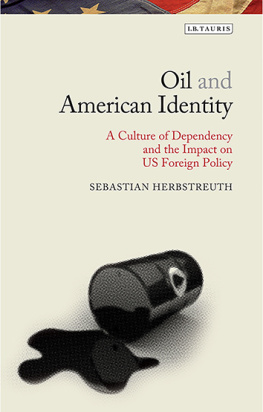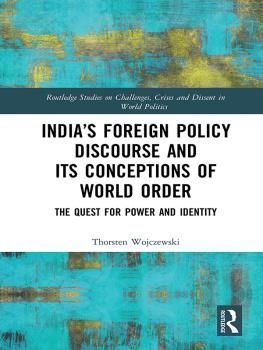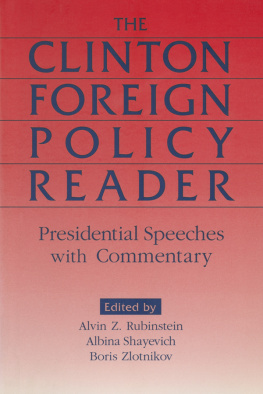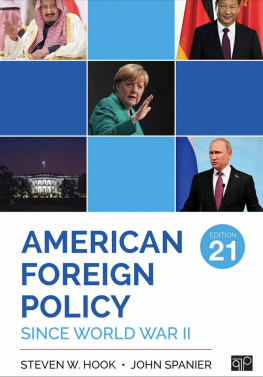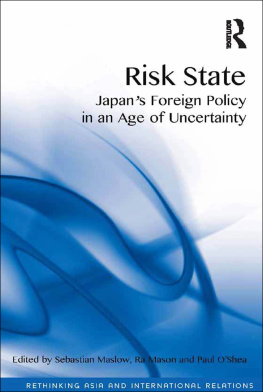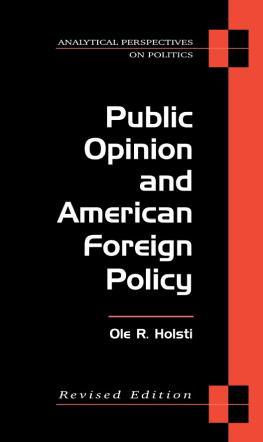Sebastian Herbstreuth completed his PhD in Politics and International Studies at the University of Cambridge and Georgetown University. He now works as a non-profit sector professional and independent author in Germany.
America's ambivalent relationship with oil its fears of foreign dependence and its wholehearted embrace of the hydrocarbon economy has been brilliantly described in this study of the role that oil has played in the country's self-image and its foreign policy. Sebastian Herbstreuth has not limited his story to the technicalities of the subject but has, instead, sought to elucidate the inner meaning of America's embrace of oil and the international oil industry which it dominates. His book provides a deeply satisfying and insightful analysis of a political romance that profoundly influences global politics, an influence that seems likely to endure despite the lowering reality of climate change.
George Joff is Senior Fellow of the Centre of International Studies at the Department of Politics and International Studies (POLIS) at the University of Cambridge
OIL AND
AMERICAN
IDENTITY
A Culture of Dependency and US
Foreign Policy
S EBASTIAN H ERBSTREUTH
Published in 2016 by
I.B.Tauris & Co. Ltd
London New York
www.ibtauris.com
Copyright 2016 Sebastian Herbstreuth
An earlier version of Chapter 4 is published in Sebastian Herbstreuth, Constructing dependency: the United States and the problem of foreign oil, Millennium Journal of International Studies 43/1 (2014), pp. 2442.
The right of Sebastian Herbstreuth to be identified as the author of this work has been asserted by the author in accordance with the Copyright, Designs and Patents Act 1988.
All rights reserved. Except for brief quotations in a review, this book, or any part thereof, may not be reproduced, stored in or introduced into a retrieval system, or transmitted, in any form or by any means, electronic, mechanical, photocopying, recording or otherwise, without the prior written permission of the publisher.
Every attempt has been made to gain permission for the use of the images in this book. Any omissions will be rectified in future editions.
References to websites were correct at the time of writing.
Library of Modern American History 8
ISBN: 978 1 78453 149 2
eISBN: 978 0 85773 839 4
ePDF: 978 0 85773 838 7
A full CIP record for this book is available from the British Library
A full CIP record is available from the Library of Congress
Library of Congress Catalog Card Number: available
LIST OF ILLUSTRATIONS
: Men can make many things we need from oil, 1957. Companies used various means of advertising the endless consumption opportunities presented by oil. This book aimed to teach young children about oil as a fuel for cars and as the basis for many of the products that made life so good in the United States.
: Sam, you're addicted to oil, 2010. The notion of an American oil addiction dates back to the 1970s, but as a dominant way of imagining the nation's relationship with oil it became important only in the twenty-first century. Since then, it has done much to reshape the way in which the problem of dependency has been debated.
: Oil pressure, 1974. To many American observers, the 1973 oil embargo seemed to show that the Arab producers could cut off US foreign oil supplies whenever they wanted. Dependency meant that the United States was at risk of losing its political independence in the face of unrestrained producer power.
: The Pentagon's Arab oil war planning division, 1975. Demands for military strikes against the Middle Eastern oil producers were rejected on several grounds. This 1975 cartoon pointed out the inherent paradox in a possible US military invasion of Saudi Arabia, a country that had long received substantial military assistance from the Pentagon.
ACKNOWLEDGEMENTS
It is only appropriate to begin a book about dependency by acknowledging one's own reliance on the generous support and expertise offered by others. This book would have been impossible without the support of George Joff at Cambridge University, who first encouraged me to explore the reservoir of crude ideas about oil that I had stumbled upon and then tirelessly helped me refine and market the products. I remain profoundly grateful to him.
In preparing this book, I was fortunate to be able to speak to a number of experienced experts in the fields of energy, American history and foreign policy. In particular, I would like to thank Tarak Barkawi, Matthew Darby, Stefan Halper, Gal Luft, Melani McAlister, David Painter, Paul Stevens and Jerry Taylor for their comments, suggestions and support.
Megan Black read through the entire first draft of the book and helped me improve it with many, many, many insightful observations on everything ranging from the basic structure of the argument to the subtleties of my theoretical position. I could not have wished for a better first reader.
I am grateful to Lester Crook, Tomasz Hoskins and Allison Walker of I.B.Tauris, who agreed to publish my work and then expertly guided me through the process of making a book out of a rather unfinished manuscript. I would also like to thank Ian McDonald, who patiently edited and polished the text until it read like proper English.
And then, finally, thanks to my two favorite people, Nina and Emma, for everything.
INTRODUCTION
A CULTURE OF DEPENDENCY
When faced with big energy challenges, the United States has only two modescomplacency and panic. This is how James Schlesinger, who served as the first US Secretary of Energy in the late 1970s, later summarized the nation's basic approach to energy. What Schlesinger's oft-quoted line suggests is that there is something profoundly emotional, erratic, even irrational in the way in which the American public and their policy makers have been dealing with issues in the field of energy.
US dependence on foreign oil, the main subject of this book, is no exception in this regard. The United States became a net importer of oil shortly after World War II, but throughout the postwar years oil imports remained a political issue confined to narrow policy and industry circles. This changed very abruptly in 1973, when a number of Middle Eastern oil producers implemented an oil embargo against the United States. In the midst of the energy crisis, the country shifted from relative complacency to near panic. President Richard Nixon had to explain to an angry American public that we had allowed ourselves to become overly dependent upon foreign supplies of a vital good and that, as a consequence, the acts of foreign rulers, even far short of military action, could plunge us into an authentic crisis.
Ever since the days of the energy crisis, oil imports have been an issue of high politics and public emotions in the United States. Every single US president since Nixon has described oil imports as a serious threat to national security, against which the country urgently needed to secure itselffor example, by achieving some form of energy independence, by changing its oil suppliers or by promoting alternative energy sources. Despite such declarations, oil imports remained a significant part of the US energy system. On the eve of the embargo in 1973, about 35 percent of the petroleum consumed in the United States was shipped in from elsewhere in the world. After many ups and downs, and a record 60 percent in 2005, US import reliance most recently declined to about 33 percent of domestic oil consumption. Besides regular presidential declarations, innumerable warnings about the dangers of foreign oil have also been issued by policy makers from both ends of the political spectrum; energy and security experts; researchers, soldiers and diplomats; writers, thinkers and journalists; andin the form of opinion polls and surveysby the American public at large. In fact, to say that US dependence on foreign oil presents the nation with serious problems of economic and national security would be considered a truism in most quarters in the United States.


